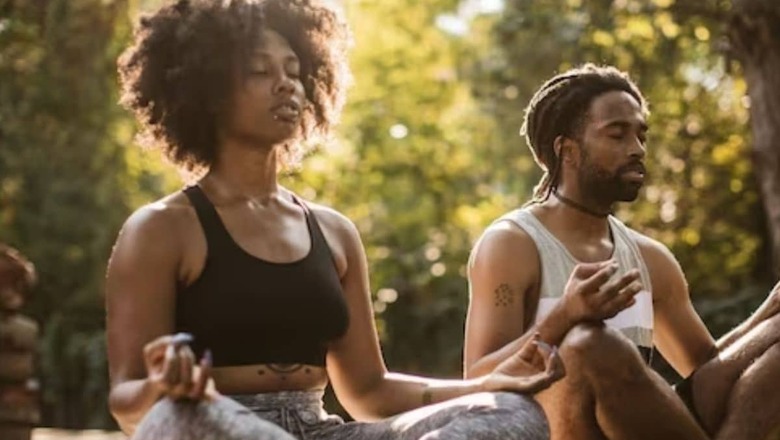
views
Health is wealth, this saying is more relevant today than ever. And it’s not just about having a physically fit body, having a healthy mind is equally crucial. Yoga is a practice that helps combine physical fitness with mental well-being. When it comes to boosting brain power, there are various yoga poses (called asanas) that can help you feel calm and relaxed.
Yoga offers more than 300 different poses, each with its unique benefits. Whether you’re new to yoga or an experienced practitioner, there are some fundamental yoga poses that everyone should include in their daily routine. However, narrowing down the selection can be a challenge. Here are the top 5 yoga poses that you should practice every day.
Siddhasana (Adept Pose)
This pose boosts your immunity and balances your nerves. To do it, sit with your legs straight. Bend your right leg and place your right foot very close to your body on the floor. Now, bend your left leg and place your left foot on top of your right calf, so the sole of your left foot touches your right thigh. Pull the toes of your right foot up between your thigh and the calf of your left leg, and the toes of your left foot down between your thigh and the calf of your right leg. If it’s hard to keep your body upright or your knees don’t rest on the floor, you can use a cushion to sit on.
Vajrasana (Sitting on the heels)
This pose helps with digestion and is great after a meal for about 5-10 minutes. Start by kneeling with your legs together, big toes touching, and heels pointing slightly outward. Tilt your upper body forward, then sit back between your heels, keeping your trunk upright. Place your hands on your thighs.
Swastikasana (Auspicious Pose)
To achieve a sense of overall well-being, you can try the Swastikasana, also known as the Auspicious Pose. Start by bending your left knee and place the left sole against the inside of your right thigh. Then, bend your right leg and carefully tuck the left foot into the space at the crook of your right leg, while the right foot goes between your left thigh and calf muscle. It’s crucial to tuck your feet in properly to make this pose comfortable, especially the bottom foot, as it might feel compressed if not positioned correctly. In conclusion, practicing these five asanas can help you attain the four core principles of yoga: holistic improvement, finding a balance between individuality and unity, self-empowerment or self-healing, and enhancing the quality and state of your mind, which is essential, especially in dealing with challenging times like the pandemic.
Sukhasana (Easy Pose)
This is a comfortable sitting posture, ideal for those who find it challenging to sit for extended periods in poses like Siddhasana, Vajrasana, or Padmasana. To do this, fold your legs so that each leg rests on top of the opposite foot, creating a popular cross-legged seated position. It’s worth noting that Sukhasana is typically not considered a meditative posture for specific reasons.
Padmasana (Lotus Pose)
This pose activates and balances the chakras while calming the mind. To get into this pose, start by sitting with your legs straight. Take your left leg and fold it so that the left foot goes into the crease diagonally to the right side of your pelvis, with the left heel as close to the navel as possible. Then, take your right foot and fold it over the top of the left, allowing it to rest diagonally on the left side of the pelvis.
















Comments
0 comment